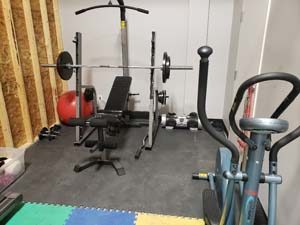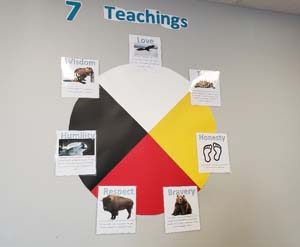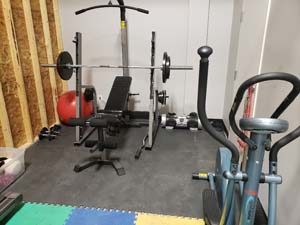When clients and visitors alike enter the Ranch’s Learning Centre, the first thing they see is a visual representation of who is in the building that day.
This isn’t a security measure – at least not in the traditional sense. Rather, it’s a way to make those who attend the Learning Centre combat anxiety that may arise from being uncertain about what their day will hold. Most of the young adults at the Centre, a vocational program which serves young people with complex needs, have been diagnosed with autism, FASD, and other complex neurological disorders. These issues mean that routine, and general knowledge of what to expect in a day, is extremely important.
 In addition, staff provide visual supports to help clients learn routine with visual schedules, and to provide step-by-step instructions for certain tasks.
In addition, staff provide visual supports to help clients learn routine with visual schedules, and to provide step-by-step instructions for certain tasks.
“Some use the visual supports to learn the routine and then go about their day; others highly rely on visual schedules and going over it every day to lessen anxieties,” explained Learning Centre manager Michelle Schwabe.
 If clients are having a difficult day, they have two sensory rooms available at their disposal. There is also an exercise room with basic equipment such as a treadmill available for clients to use.
If clients are having a difficult day, they have two sensory rooms available at their disposal. There is also an exercise room with basic equipment such as a treadmill available for clients to use.
But the success of the Learning Centre is much more than facilities, visual supports, and routines. The program is person-centered – meaning that each client’s individual needs and interests are taken into account when deciding the goals they will work toward and the ways they will accomplish them.
Michelle explained, “It’s all about what’s in the best interest of the person we’re supporting. What does a good or bad day look like for them? Then deciding how to facilitate a day that they would enjoy.”
All of this would be hollow without the staff, who are the heart and soul of the program.
“Our staff have a lot of heart. Watching them work with these guys, it’s an amazing thing.” Michelle said.
What a day looks like in the program
 The day-to-day routine at the Learning Centre is a standard one: in the morning, clients attend to various work responsibilities, from pick up and drop off recycling, to table-top tasks depending on their skill level. At lunch, some of the clients participate in the veggie plus program, cutting up fresh vegetables to add to everyone’s mid-day meal; learning both the life skill of preparing meals and the importance of healthy eating.
The day-to-day routine at the Learning Centre is a standard one: in the morning, clients attend to various work responsibilities, from pick up and drop off recycling, to table-top tasks depending on their skill level. At lunch, some of the clients participate in the veggie plus program, cutting up fresh vegetables to add to everyone’s mid-day meal; learning both the life skill of preparing meals and the importance of healthy eating.
“These kinds of things are important because everyone needs a sense of purpose,” said Michelle. “Our guys like to help people so utilizing and developing daily functional living skills, is important. Learning household duties like laundry, and dishes, and healthy living, all those pieces that are so important to you and I, are also important to them.”
In the afternoon, clients attend various community outings – from gymnastics to music therapy, community inclusion activities are key.
“Being welcomed into the community is a huge component, because although they have developmental disabilities, they’re just as much contributing members of the community as you and me are. So teaching skills regarding socialization and being an appropriate, contributing member of society is very important,” Michelle said.
Learn more about the Learning Centre’s summer programming in Michelle’s upcoming blog.


